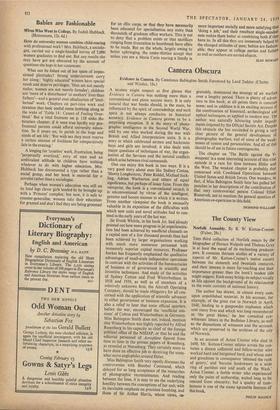Babies are Fashionable
Wives Who Went to College. By Judith Hubback. (Heinemann, 12s. 6d.) How do university women combine child-rearing with professional work? Mrs. Hubback, a sociolo- gist, carried out a single-handed survey of 2,000 women graduates to find out. But any results she may have got are obscured by the amount of questions she begs in her comments.
What can be fished out of her spate of impas- sioned platitudes? Strong undercurrents carry her along : 'highly educated' women have special needs and deserve privileges; 'Men are not merely males; women are not merely females'; children are 'more of a disturbance' to mothers' lives than fathers'—and a general over-idealisation of 'intel- lectual' work. Chapters on part-time work and taxation that look useful come bobbing along in the wake of 'Table 14: Causes of Feeling Over- tired.' But a vital footnote on p. 118 sinks the taxation chapter; if it were true hardly any pro- fessional parents could afford university educa- tion. So it pours on, to perish in the bogs and sands of sex life : 'But with sex they must reserve a certain amount of liveliness for comparatively late in the evening.'
A longing for 'creative' work, frustration, being 'perpetually overtired,' envy of men and an ambivalent attitude to children have nothing whatever to do with higher education. Mrs. Hubback has documented a type rather than a social group, and her book is material for a novelist rather than a sociologist.
Perhaps when women's education was still on its hind legs clever girls tended to be brought up with a 'Princess' complex; but now, it is safe to counter-generalise, women take their education for granted and don't feel they are being groomed for an elite corps, or that they have necessarily been educated for specialisation any more than thousands of graduate office workers. This is not to deny that a problem exists or that sacrifices ranging from frustration to heartbreak have often to be made. But on the whole, largely owing to better upbringing, the under-thirties accept that unless you are a Marie Curie rearing a family is more important socially and more satisfying than 'doing a job,' and their resultant single-minded' ness makes them better at combining both if theY have to. In all this they are immensely helped bY the changed attitudes of men; babies are fashion' able; they appear at college parties and fathers as well as mothers are envied objects.
JEAN HOWARD


































 Previous page
Previous page